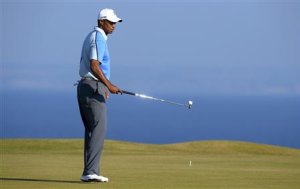How Arnold Palmer changed golf forever
Like
Dislike

Jay Busbee July 17, 2013 4:48 AMYahoo Sports

Arnold Palmer played in his first British Open in 1960 at St. Andrews. (Getty Images)LATROBE, Pa. – One summer morning in 1960, a young man teed up a golf ball in a tournament at a small course in Scotland and changed the course of sports history.
The man was Arnold Palmer, who was at the time carving new trails all over the sports landscape with his style, his television presence and his off-course management team – you can draw a direct line from Palmer's groundbreaking moves in the 1960s to the multibillion-dollar sponsor-and-celebrity-driven business of sports today.
Even more impressive than the fact that Palmer made rich people richer is this: When he flew across the Atlantic Ocean to play in the 1960 Open Championship – or the British Open, if you're feeling particularly American – he broke down barriers between continents.
In 1960, the 30-year-old Palmer was the most famous athlete on the planet. He'd already won both the Masters and the U.S. Open on come-from-behind Sunday charges. He would capture eight of the 27 tournaments in which he played, earning a then-record $80,000 in total prize money.
The Open Championship? It was an inconsequential tournament from an American perspective, irrelevant to the burgeoning United States golf scene. For pros, the hassle of traveling to the United Kingdom wasn't worth any potential reward. Every player had to survive a 36-hole qualifier. The winner received only $3,500, compared to $14,400 at the U.S. Open, and the total purse at the Open Championship was $19,600, less than a third of the U.S. Open's $60,720. (No, there are no zeroes missing from those figures.) Moreover, the tournament often conflicted with the stateside-yet-still-prestigious PGA Championship.
Still, Scotland is golf's ancestral home. And by 1960, Palmer already had a grasp on his place in golf's history. He understood that while he already owned America, if he wanted to make a true imprint on the game, he'd have to broaden his reach. Bobby Jones had won the Open Championship three times, and Palmer knew that if he wanted to match Jones' influence, he'd have to leave the United States as well.
"My father said, 'If you're going to be a great player, you're going to have to play internationally, you're going to have to win internationally,' " Palmer told Yahoo! Sports recently. "That was my motivation."
That, and the possibility of opening up an entire new continent to Palmer's charm.
Mark McCormack, Palmer's business partner and the founder of sports superagency IMG, helped convince Palmer to export his uniquely American blend of style and skill to Europe.
(In fact, Palmer may be responsible for naming one of the most prestigious honors in sports, as recounted in Ian O'Connor's biography "Arnie & Jack." En route to St. Andrews, he remarked to sportswriter Bob Drum that he'd like to add the British Open and the PGA Championship to his collection for a "grand slam." Drum wrote it up that way, and golf's Grand Slam – once defined as the U.S. and British Opens and Amateurs – became what we know it as today.)

A 30-year-old Arnold Palmer watches his shot while playing in his first British Open. (AP)It wouldn't be easy. Palmer tried his best to prepare for the links style of golf while in America, but there's only so much one can do to replicate howling ocean winds, marble-hard greens and vicious seaside roughs in western Pennsylvania. But he did put in the work with the small ball, and that may have made all the difference.
Before 1990, the United States Golf Association and the Royal & Ancient Golf Club, the arbiters of golf rules in America and Europe respectively, disagreed over the size of the golf ball. The USGA mandated a ball with a 1.68-inch diameter, while the R&A permitted the use of a 1.62-inch diameter ball in its tournaments, which included the Open Championship.
The balls weighed the same, but the so-called "small ball" was easier to drive and shape in the wind. Palmer did what he could to learn how to work the small ball, but there's a big difference between standing at the tee at your hometown country club and standing at the tee at St. Andrews, even for Arnold Palmer.
"If I were going to blame not winning the first one on anything," Palmer now says, "it might be that I was not as familiar as I should have been with the small ball."
In those days, the Open Championship would begin with 18 holes on Wednesday, another 18 on Thursday, and a concluding 36 on Friday. But, then as now, the weather made its presence known, raining out chunks of the week's rounds and forcing a Saturday finale.
"Whenever a tournament is held at St. Andrews, the celebrated Old Course invariably tries to upstage the biggest names in golf and become the central figure in the show," Herbert Warren Wind wrote in the July 18, 1960 issue of Sports Illustrated. "Last week, when the old gray town on the North Sea was the scene, appropriately, of the 100th anniversary British Open, it turned the force of its personality on Arnold Palmer." (Side note: The publication date of Wind's article was nine days after the tournament had ended. Nine days after this year's Open Championship ends, a fair percentage of sports fans won't even remember who won.)
Palmer had spent the days ahead of the Open being a gracious guest, signing autographs and attending event after ceremonial event. He spent evenings memorizing the locations of St. Andrews' carnivorous pot bunkers, trying to map strategy for varying wind conditions. And so when it came time to qualify – yes, evenPalmer had to qualify his way into the Open Championship – he did so easily.
Without a doubt, Palmer was the spotlight player in that year's tournament, but he wasn't the only story. Also in the field: 58-year-old Gene Sarazen and the 25-year-old defending champion, Gary Player. The leaders through the first two days, however, were Australia's Kel Nagle and Argentina's Roberto di Vicenzo, still eight years away from his catastrophic Masters flub. (He would sign an incorrect scorecard, costing himself a chance at a playoff, and said, "What a stupid I am.")
Palmer had mastered the tee shots at St. Andrews but not the greens, with putts sliding agonizingly close to the cup but not into it. Halfway through the tournament, he was seven shots off the lead, but as he'd done before at the Masters and the U.S. Open, he closed the gap. Rain forced the final holes to Saturday, and Palmer responded by dropping putt after putt, closing with an 18th-hole birdie.
It wasn't quite enough. Nagle was able to hold off Palmer to win by a single stroke. But even as Palmer sighed, "It wasn't good enough, it wasn't good enough," it was: His four-round mark of 279 had tied the previous record at St. Andrews.
Palmer's appearance provided an immediate boost for the R&A, which recorded a $10,000 profit from the 1960 Open, double the previous year and a boon to the cash-strapped organization. The armada of American media that followed in Palmer's wake spread the word of the Open Championship far and wide. And once Palmer returned to capture the next two Open Championships, the tournament's future status as a fixture for American golfers was assured.
"I was trying to set an example for other Americans, other international players,” Palmer now says. "Even though I didn't win, I won twice the next two years, [because I had] the incentive I needed to continue.”
These days, of course, the Open Championship is a can't-miss stop on the year's schedule, for both players and fans. More than a dozen Americans have won the tournament, ranging from icons like Tiger Woods, Jack Nicklaus and Tom Watson to, well … John Daly, with the most recent being Stewart Cink in 2009. Golf's frontiers are no longer in the United Kingdom; they're in Hong Kong and Abu Dhabi.
Palmer won't be in attendance at this week's Open Championship, but he'll be watching from his home in Latrobe, Pa. And his thoughts will almost surely go back to those days of half a century ago, when one man changed an entire sport.



